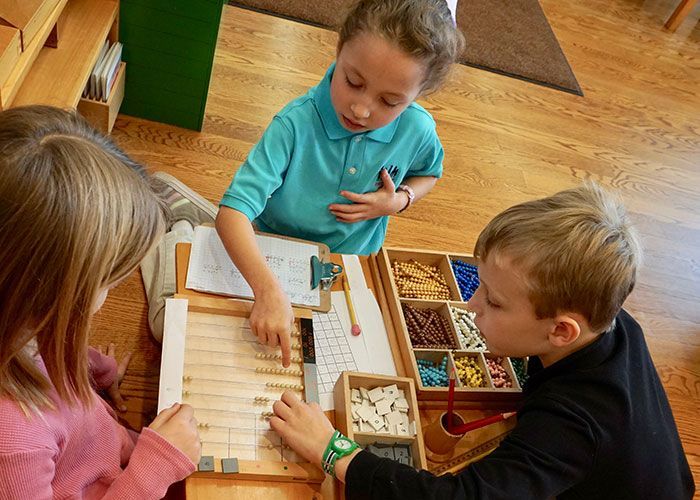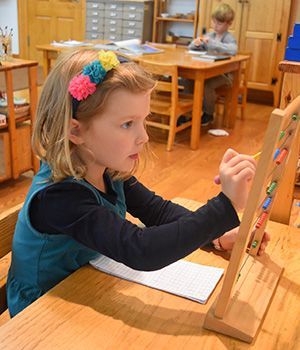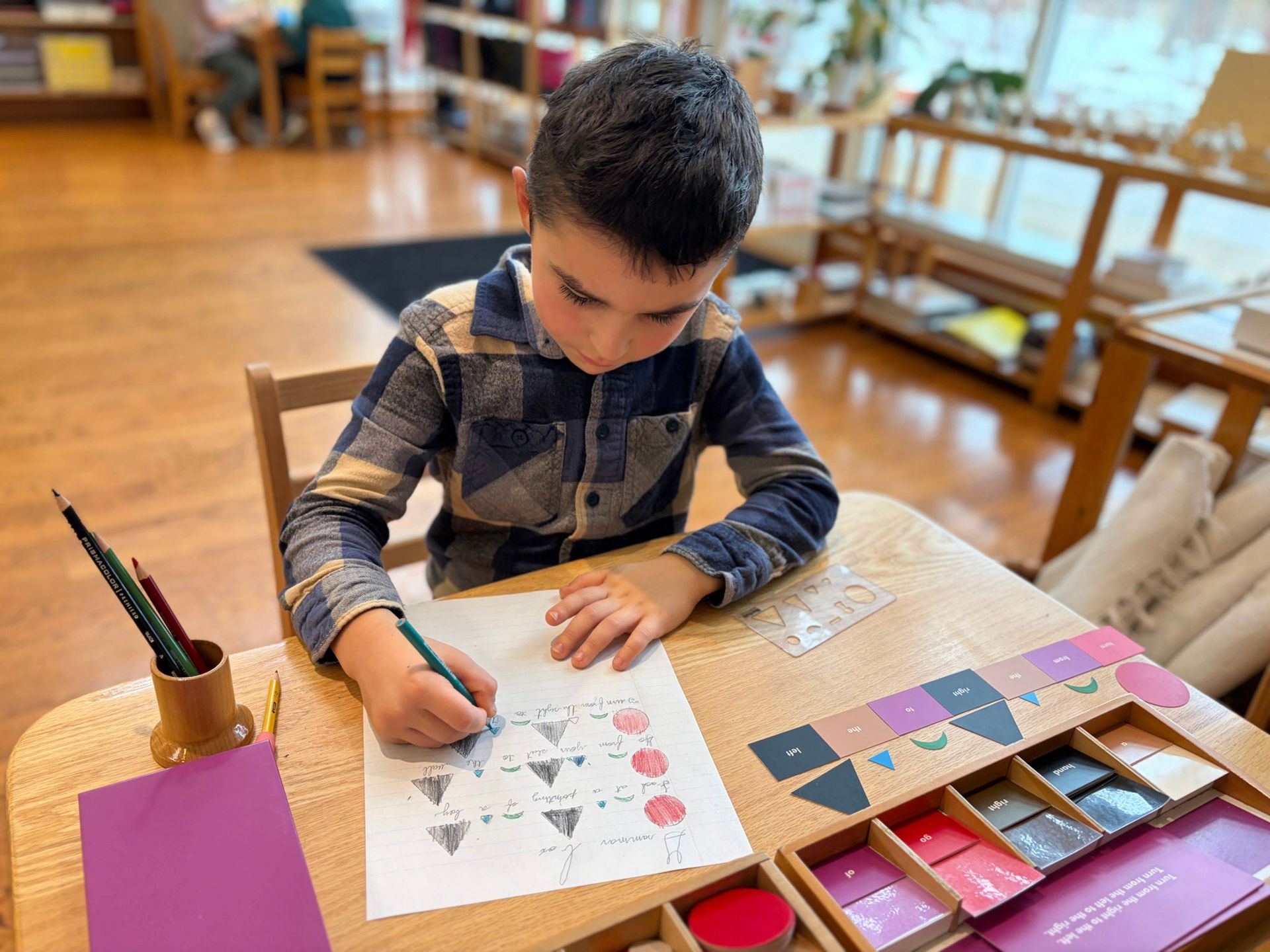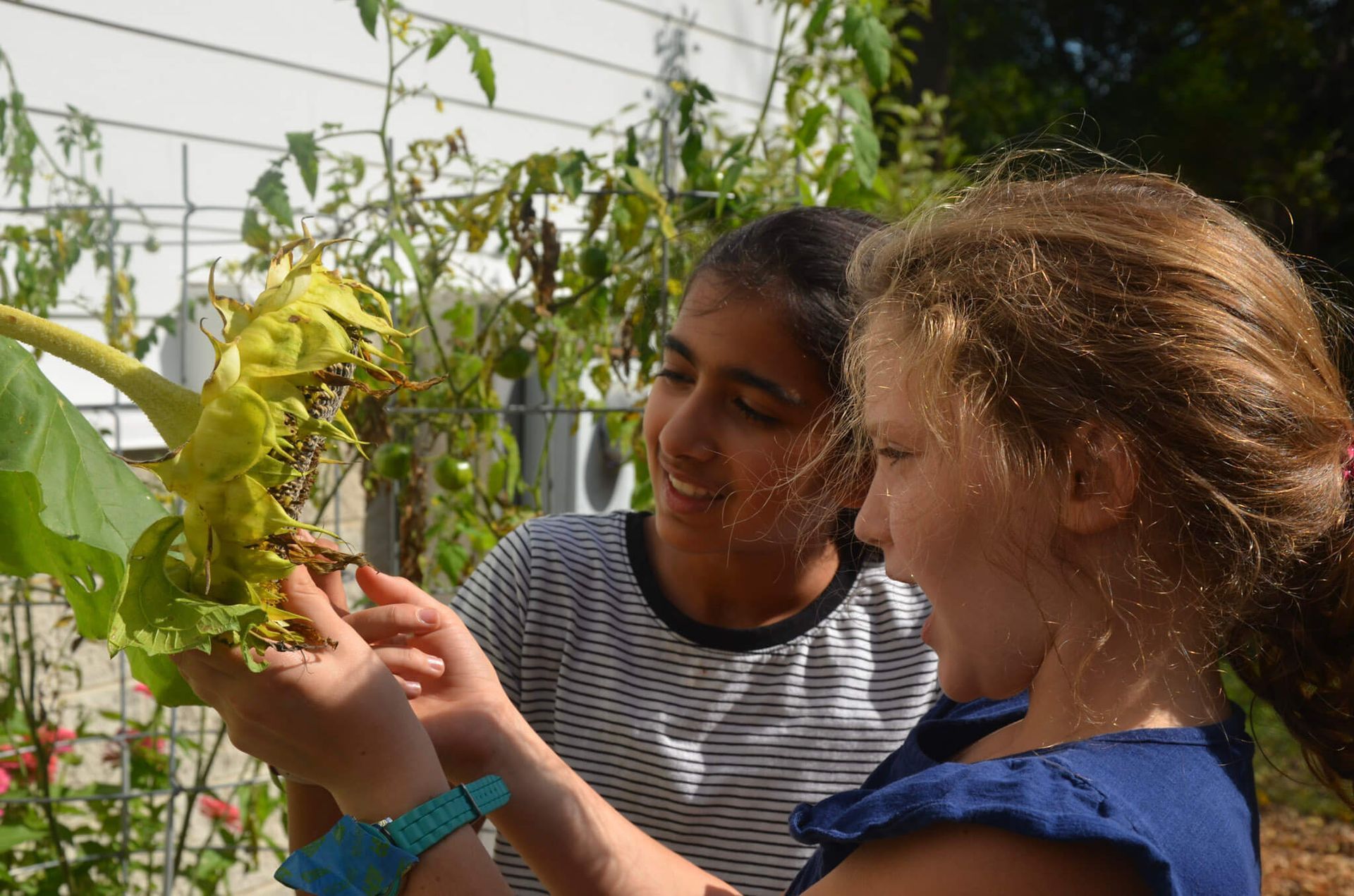
In a previous blog post, A Montessori Guide to Technology and Teens, we explored how we can help our adolescents begin to use technology responsibly, as part of adapting to the adult world. Here we will discuss a Montessori perspective on the role of technology and screen time for younger children, under age twelve.
What’s the Big Deal?
These days, messages from marketers are strongly pro-technology for children, and even some educators are strongly pro-technology. Everyone has their own experiences to base their judgments on; if you’ve seen negative results in your own family, you might look to the current research to validate your sense that technology is not a good fit for childhood. Conversely, if you’ve had positive or neutral experiences with your children using technology, then you probably think people are going bananas over something minor. Either way, most parents don’t have the time to conduct a thorough Ph.D.-level investigation before deciding whether their child can have that video game or the latest digital device they just opened under their grandparent’s Christmas tree this year. So, what are we to think about this debate over technology for children, and what do we want to steer our children towards in our own homes?
When we look at this issue from the perspective of a Montessori approach, we consider: what children need for optimal development, the importance for a child of building their foundation for life, preparing your home environment, basing your decisions on observations, and keeping your long-term goals in mind.
What Children Need for Optimal Development
Dr. Montessori pointed out that under the age of six, children need reality so that they can form their understanding of it. They need to touch, feel, taste, smell, move and experience the real world. Human beings are sensorial learners when young. From their sensorial explorations, young children learn things about physics, textures, and qualities of the world. Consider that no screen can provide this information in a natural or full-sensory way. Children need to discover for themselves what kind of structures collapse under pressure and which ones don’t, and to figure out why by exploring and experimenting. To be effective, this has to happen in reality, not virtually.

Dr. Montessori wrote, “There are many who hold, as I do, that the most important period of life is not the age of University studies, but the first one, the period from birth to the age of six. For that is the time when man’s intelligence itself, his greatest implement, is being formed… The child has an intelligence of this unconscious type, and that is what brings about his marvelous progress. It begins with a knowledge of his surroundings. How does the child assimilate his environment?” (The Absorbent Mind). The young child does this with an intense sensitivity, awareness of, and interest in all that is around him, and this is accomplished with an absorbent mind that seems to soak in information with ease.
Between ages six and twelve, children are on a quest for intellectual information and want to seek it out for themselves. They continue to explore with curiosity, but now on a more sophisticated level. They actively form their reasoning abilities and social cognition. They need to play with other children to figure out how to get along, strengthen their bodies, and build things from their imaginations. Children these ages need to play with other children and interact to develop their own skills of collaboration, reading social cues, and communication. There is no virtual substitute for this kind of learning. The more time spent developing these abilities, the more adept a child will be. It can also be helpful for children to simply read a book. It can be fiction or non-fiction, but books provide ample opportunities for learning and thinking without any distractions.
Building the Foundation
Some parents will wonder, “But how will my child know how to use the computer well? He will be so behind his peers!” Joe Clement and Matt Miles, co-authors of Screen Schooled: Two Veteran Teachers Expose How Technology Overuse is Making our Kids Dumber, explain that this is as silly as thinking that anything having to do with technology today will be the same by the time our children are adults. They ask, “What lessons in technology are we going to teach five-year-olds that will still be relevant when they enter the work force sixteen years later? This would be the equivalent of elementary schools of the 90s replacing time spent teaching reading, writing, and arithmetic with lessons on how to program your VCR.” Instead of spending time with technology, we need to allow our children to focus on building themselves as learners, thinkers, explorers, and communicators.
Another parent concern might be, “There are times when my child just can’t be patient, and rather than getting irritated with her, I’d rather let her watch something (on a screen) so I can make the dinner or get some quiet. Especially when we are on an airplane or in the car.”
Here we have to stop and ask ourselves, what did parents used to do at such times? Sure, our lives are more hectic than perhaps in the past, and parents may be more stressed, but these are very important opportunities, if you can see them as such. Recently, I sat down on an airplane and a young mother sat across the aisle from me with four little children. She had an infant on her lap, a two-year-old, a three-year-old (I picked up that this was a cousin), and a five-year-old in seats alongside her. Holy cow, I thought, this is going to be a loud, stressful flight! But just as I assumed this mother would pull out some screens to get everybody occupied, she started talking with them. She played itsy-bitsy spider, she asked them questions, she hugged and kissed and laughed with them.
I noticed that this mother was not the source of the children’s entertainment, however. She was calm, quiet, and relaxed. The children climbed around, played with toys, talked to each other and colored on a coloring book throughout the flight. There was some crying, and this mother naturally looked fatigued when it was time to de-plane. But I marveled at how she had taken this time with her children to interact with them. This was two hours of language development and learning how to relate. This mother had chosen to just be with the children. Because they were not all competing for her attention the whole way, it seemed that they were probably accustomed to entertaining themselves.
This is key: our children will NOT learn to entertain themselves or calm themselves if their long, boring, or uncomfortable moments are filled with screen time or a digital toy. This is an incredibly important skill, one that comes front and center stage when children feel anxious, worried, or self-doubting. While young adults in college are reportedly having a harder time than ever with anxiety, stress, and depression—so much so that the University of Chicago, Stanford, and many others now offer undergraduate courses in learning to handle strong emotions—our children need to begin learning these skills, naturally, from very young ages. We cannot know for sure yet, but it seems logical that the constant use of smart phones, laptops, tablets, etc. could be a factor in this trend of anxiety;the first thing experts recommend to calm one’s mind is to focus on your breathing and to notice the present moment…and to put those devices away.

How about other parental concerns, such as, “My son feels weird when he isn’t sure what other kids are talking about outside of school,” or, “We go to my daughter’s cousins’ house, and they cannot take their eyes off the screens. My daughter ends up lonely because they won’t stop playing their video games and engage with her.” My advice is to talk to your children (and your relatives) about ways to respond to this. Suggest an experiment: let’s see what the children do and how they act after a couple days together without technology. After initial protest and boredom, most children will surprise us by enjoying the things that all children enjoy—playing creatively and interacting, using their imaginations, and being physically active. Letting them come up with the ideas of what to play and how to play fosters an appetite for more of the same.
Here’s another concern: “My son stares at screens in the airport and in stores. Maybe if we let him spend a little screen time at home he wouldn’t be so attracted to them. He’d get over the allure.” This sounds logical, but because of the apparent addictive nature of technology, especially for young children, this is not something you de-sensitize your child to. The focus needs to be instead on maximizing your children’s natural interactions and experiences in life, making them stronger and more capable of controlling themselves when they face temptations. The warnings about the addictive nature of technology for children are growing, and the only ones protesting are the marketers. When you see pro-technology test results, check to see who funds that researcher; most often, it is a tech company. The unbiased research that is coming out every month now strongly shows negative effects on children.
Another common belief is that technology use is all around us, it is part of our world, and it isn’t going to go away, so we have to learn to live with it. This may be the case, but learning to live with it should not mean allowing our children or ourselves to develop addictions to it. Although most of our households today have an Internet connection and multiple smart devices connected to it, there are ways to limit children's screen time. If talking to them about it or setting verbal restrictions do not help, you could try alternative measures like talking to your Internet provider about parental controls and monitoring services.
There is a growing awareness in the past year about how drained, anxious, overstimulated, irritable, or burned out people feel after using technology for many hours. We are now seeing a wave of interest in controlling our use of technological devices with programs and apps, rather than letting them control us and our behavior. We will continue to learn more about how to live with technology as such an integral part of our daily lives. In the meantime, I urge parents to stick with what we know is healthiest for our children’s development. The early years are critical in building the foundation for their lives. Technology is changing rapidly, but the needs of human beings are relatively consistent and do not change.
To understand how developing themselves as people will set our children up to be the innovators of the future, turn to Walter Isaacson’s The Innovators, an excellent book about “how a group of hackers, geniuses and geeks created the digital revolution.” What struck me most about this fascinating story of the evolution of computers is that the people behind these machines were creative thinkers and collaborators. The very skills that drove their success as computer designers were ones that develop away from computers in childhood. In adulthood, we are ready to think more abstractly and build off of the base of our abilities of concentration, teamwork, reflection, imagination, and understanding of the physical world and how things work. Abstracting is a leap of the mind that happens because of all that has come before. Building this base is where our focus needs to stay with children. This is why tech experts in Silicon Valley keep their own children off screens at home and deliberately choose low-tech schools. (See the articles Silicon Valley Parents Raising Their Kids Tech-free—and it Should be a Red Flag and A Dark Consensus About Screens and Kids Begins to Emerge in Silicon Valley .) If these are the choices of experts at the forefront of the technology industry, parents would be wise to take notice.

Prepare the Environment
“Isn’t technology just part of the prepared environment my child is growing up in?” The key word here is prepared. Children do learn from what they are exposed to in the environment. What Dr. Montessori referred to as a prepared environment for children to learn from was the emotional, social, psychological, and physical environment that surrounds them. Young children learn through direct interaction, facilitated by their five senses: touch, smell, taste, hearing and seeing. The more senses are integrated in use simultaneously, the more complete the learning experience, and the more attentive a child’s mind becomes. This is attention directed by one’s own will, a very important step towards developing self-control and self-discipline.
Parents must ask themselves if a screen provides an environment that has been prepared for their child’s best development. Has the content been prepared to be suitable and to match his/her developmental needs? Or is it designed by experts—whatever their degrees and expertise may be—to allure children and make them want more and more? The more time a child spends with technology, the less time is being spent directing their own will or making their own decisions. Furthermore, they are sitting without moving while thinking. As Dr. Montessori pointed out, “When there is motor and physical activity, you can see a more important kind of education, a kind of education that takes the force of life into account…If we do not take [this] into account, we miss the best part of education” (London Lectures). In this sense, “education” is all the learning our children do throughout their days. Since Montessori made her initial observations about the importance of movement in the learning process, there has been an abundance of research that shows that movement and cognition are intertwined. For a review of the research, see the chapter on movement and cognition in Dr. Angeline Lillard's book Montessori: The Science Behind the Genius.
Base Decisions on Observations
Dr. Montessori’s work was built upon her observations. She watched children interacting with their surrounding environments and made discoveries based on these careful and repeated observations. I encourage you as a parent to make your decisions about how your child is responding to the environment, or to technology, with careful observations. Is your child—of any age—more relaxed, alert, rested, cooperative, content, curious, and communicative after spending time on a screen? If he or she is irritable, flitting from thing to thing with little concentration, easily frustrated, or impulsive, these may be clues as to how the screen time affects him or her.

Young children are far more sensitive than adults, as they are sensorial learners. Their nervous systems are more sensitive. As adults, we need to be aware and responsive to how technology affects them. Children differ as individuals, and some may handle screen experiences with very little observable effects while others are thrown off for days in their mood, behavior, and impulse control. For sensitive children, it is totally unfair to expect them to handle exposure to screens and then to control themselves and forget about the stimulation they just received.
As suggested by recent research and Richard Louv’s Last Child in the Woods, time outdoors in nature encourages reflective thought and helps us to feel refreshed and calm. Likewise, getting our children out into the woods—to smell the air and flowers, experience the mud and leaves, see the sky and clouds, and hear the birds and wind—will have positive effects on their moods and outlook. Take notice of how your young children behave and feel after such times.
Keep Your Goals in Mind
Our goal is help our children develop a strong ability to focus and concentrate. This will be put to the test when they are surrounded by distractions. As a Forest Bluff alumna recently told us, this ability to focus is critical for her as a medical student working in the hospital atmosphere, with so much going on all around and stressful pressures. She notices that many people have trouble sitting down and staying focused to get very important work done, even in medical school. This ability is one she says she formed as a child at Forest Bluff, during invaluable years of brain development. We as parents need to prioritize concentration, not only for this reason, but because all learning depends on the foundation of being able to attend—to focus one’s attention and stay with a train of thought by one’s own power—in order to be productive in a meaningful way.
Sep Kamvar, a former Google executive, associate professor of the MIT Media Lab, and founder of Wildflower Montessori Schools, explains how technology interferes with the ability to attend:
"With sudden or novel stimulus, like a ball moving across the screen or a page-change instantaneously from a button press, our biological response is that the blood vessels to the brain dilate, and the blood vessels to other major muscle groups constrict. Cortisol is released, heightening mental arousal and sharpening visual and auditory perceptions, and attention is heightened. Evolutionarily, this response protected us when we heard the rustling of a tiger. In television advertising, it’s used to sell products. And on the short-term, it appears to work.
The problem, of course, is that the child becomes habituated to these jolts and loses their natural capacity for attention.
In Montessori, the whole focus is on developing a child’s intrinsic capacity for attention. The ability to learn derives from the authentic development of that capacity. To compromise attention in order to learn math more quickly is like killing the goose that lays the golden eggs."

When you have established capacity for attention as a developmental priority, align your decisions with your desired outcome. Technology rapidly changes every year, and we still do not know what the long-term effects of our daily use will be, especially in children. Why take a chance through this experimental phase? We have enough discouraging information already about the negative effects of technology use and so few positives to make those risks worthwhile. See the references at the end of this article for research that gives compelling reasons to be concerned about how technology is affecting learning, brain development, and social interactions, specifically the Wall Street Journal article How Smart Phones Hijack Our Minds and the Developmental Psychology article Learning on Hold: Cell Phones Sidetrack Parent-Child Interactions, both of which cite other related reports.
Deciding Your Course of Action
Based on our experiences over the past 35 years with children and the growing body of research on how technology use is negatively affecting young people, we strongly urge parents not to give technology devices to their children enrolled at Forest Bluff, including screen time at home. For excellent research on how brain structures are negatively impacted by screen technology, read How Has the Internet Reshaped Human Cognition? When children are developing their brains and learning to function, control their impulses, regulate their emotions, pay attention, and remember new information, they need real life experiences.
Our children will all see screens and might occasionally play with a friend’s or a relative’s device when in other people’s homes. But we do not recommend giving your child a device or granting them screen time in your own home on computers, phones, TVs, handheld digital devices, etc. There are so many other wonderful ways to spend time that will give your child the developmental advantages of building creativity, powers of reflection, curiosity, interest, physical strength, empathy, and relationships. A healthy approach is to build on a strong, intellectually rich childhood before entering the world of technology. Our children are forming the foundation for their characters, choices, and intellects from time spent outdoors being physically active, reading, in conversation, and contributing to the life of their homes by collaboration. First and foremost, they are learning how to be good people.
Technology is easy to learn in just hours; these other traits take years to form. In the end, you have to consider: “What’s the trade off?”
Recommended Reading
Articles
Children's Screen Viewing is Related to Psychological Difficulties Irrespective of Physical Activity
Silicon Valley Nannies are Phone Police for Kids
Books
Screen Schooled: Two Veteran Teachers Expose How Technology Overuse is Making our Kids Dumber
Joe Clement and Matt Miles
Wired Child: Reclaiming Childhood in a Digital Age
Richard Freed
Irresistible: The Rise of Addictive Technology and the Business of Keeping Us Hooked
Adam Alter
The Shallows: What the Internet is Doing to Our Brains
Nicholas Carr
Flow: The Psychology of Optimal Experience
Mihaly Csikszentmihalyi, PhD
The Marshmallow Test: Why Self-Control is the Engine of Success
Walter Mischel


